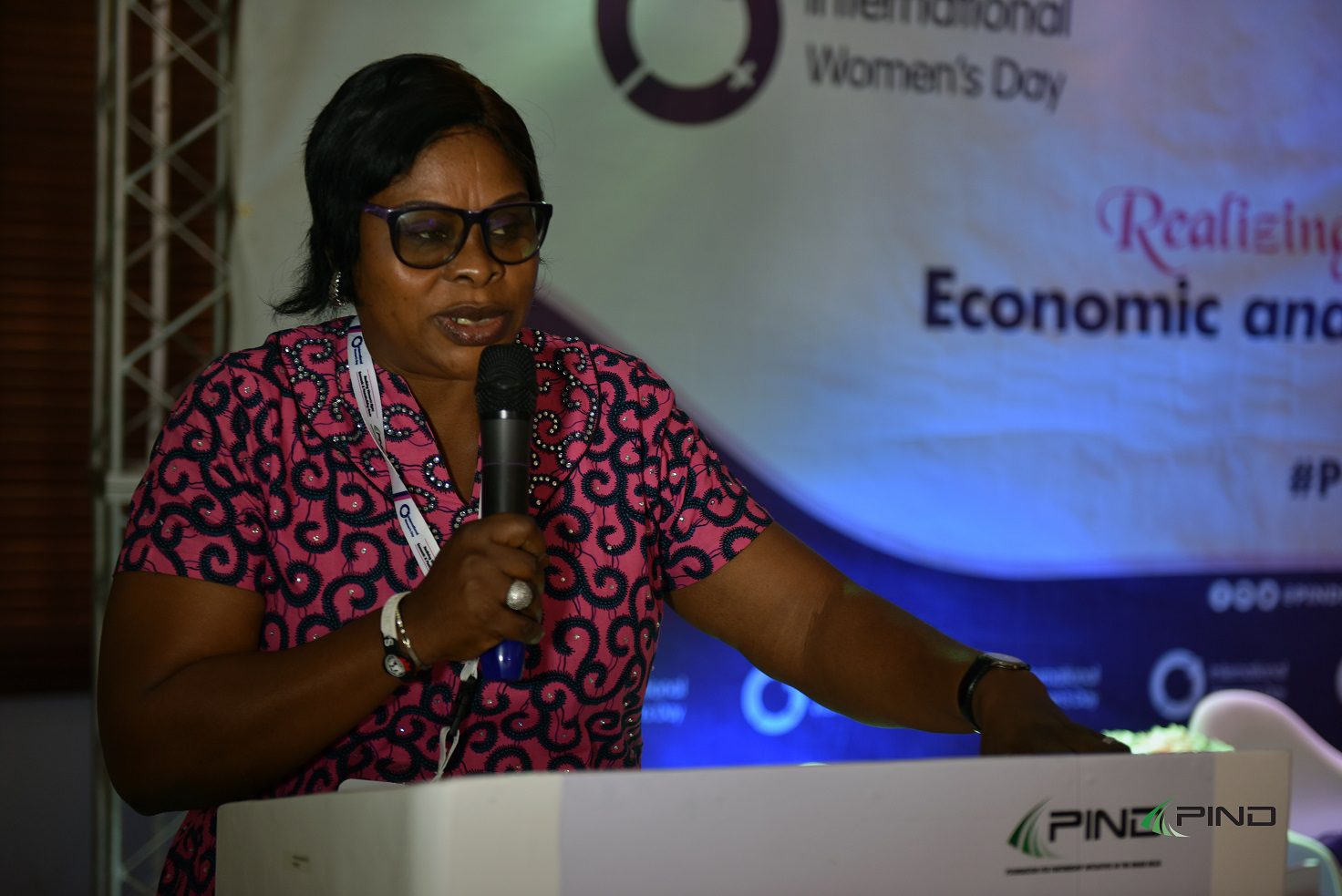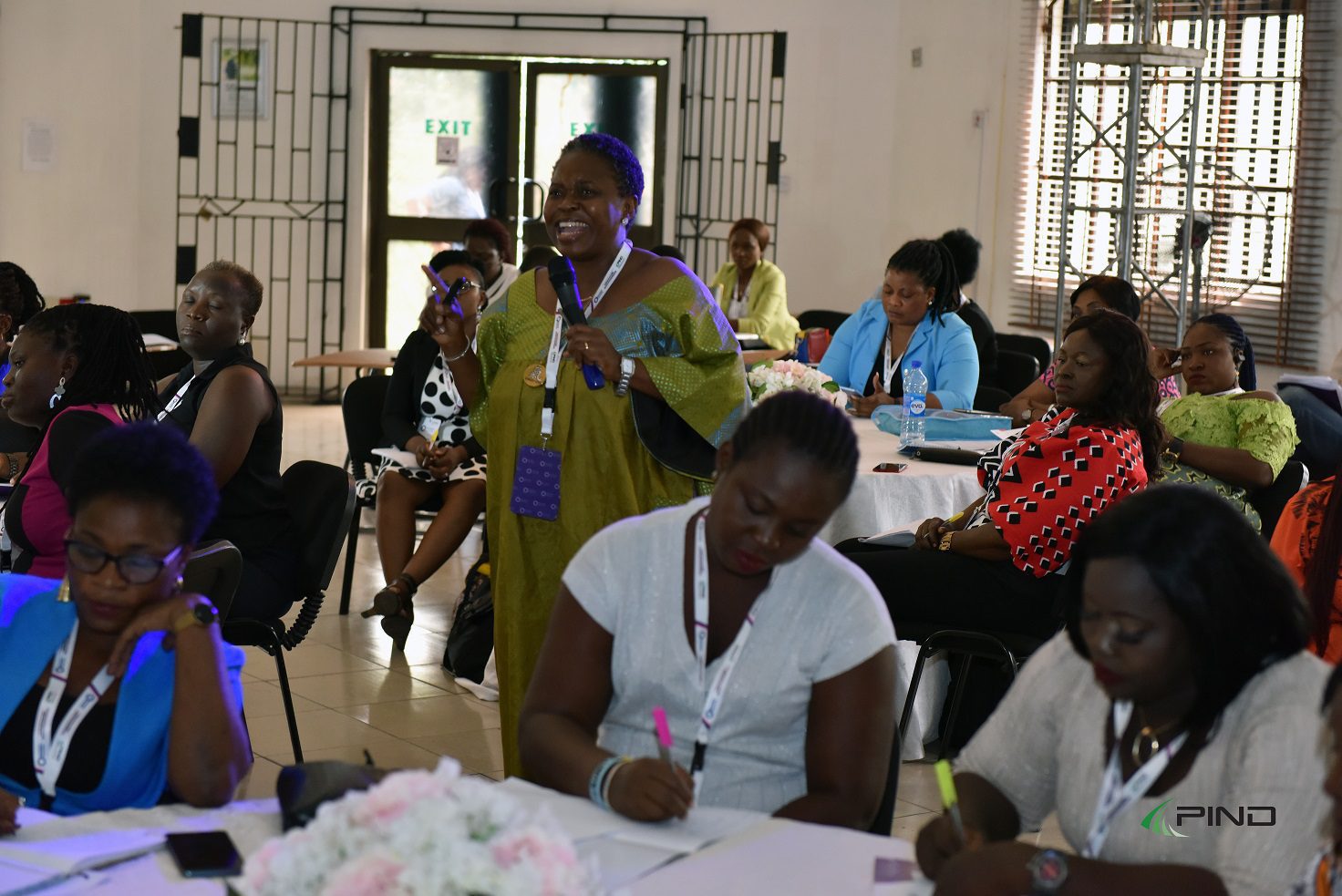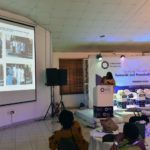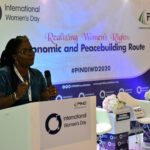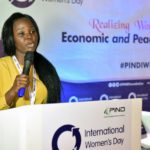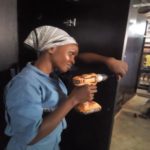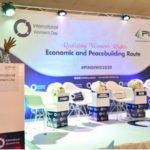The Foundation for Partnership Initiatives in the Niger Delta (PIND) on March 19, 2020, held a one-day roundtable at its Economic Development Centre (EDC) Warri, Delta State to celebrate the 2020 International Women’s Day which coincides with the United Nation’s 25th anniversary in advancing gender equality and the common good of women.
In line with the UN Women’s theme for International Women’s Day 2020 being “I am generation equality: realizing women’s rights”; PIND chose the subtheme ‘Realizing Women’s Rights: Economic and Peacebuilding Route’ to amplify the Foundation’s gender mainstreaming journey so far, success stories from program participants, opportunities for women and the impact of PIND’s economic development and peace building programs in the Niger Delta. The event pulled together women and girl leaders, activists, women rights advocates, women who have gained economic empowerment, those who became change agents and peacebuilding champions as a result of PIND’s efforts throughout the years to showcase successes, celebrate achievements made and document prospects obtainable for women in the Niger Delta expanse.
Here are noteworthy lessons we learned from different sessions of the event.
Insight 1 – From Keynote Addresses about Gender Mainstreaming.
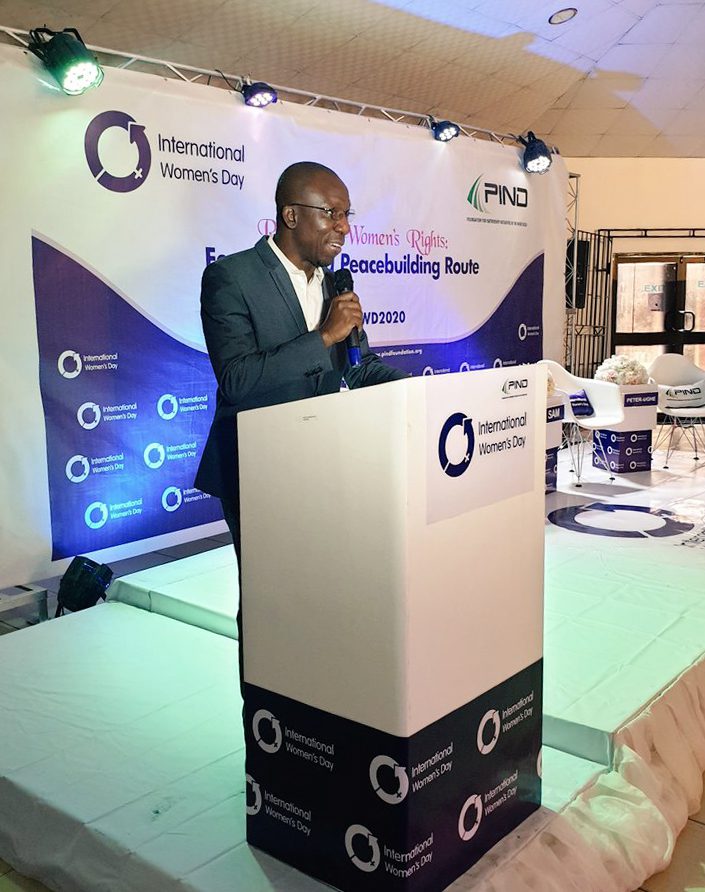
PIND’s Economic Development Manager, James Elekwachi, welcoming partners and participants.
PIND’s Economic Development Manager, James Elekwachi, took the welcome address and handed over to Mrs. Faith Okpohworho, Director Women’s affairs, who presented a goodwill message on behalf of Mrs. Flora Alata, the Honorable Commissioner of Women Affairs, Community and Social Development, Delta State. Thereafter, Bose Eitokpah, a Gender Specialist addressed partners and participants on PIND’s gender mainstreaming and the journey so far. Jointly, the attendees learned the following important lessons from their various speeches:
- Gender mainstreaming is not mainly about including women as project participants; it is also about deliberately addressing issues negating women’s economic and social well-being.
- Mainstreaming gender demands that structures should be put in place by any organization. Some of such structures are the gender offices, committees, partners, trained Desk Officers, as well as matrices, checklist, framework and tools for monitoring progress made.
- For effective tackling of issues of gender-based violence, it is essential that key institutions of government and peacebuilding organizations must work at ensuring operation of customary courts in the region.
- To break stereotypes, realize total women’s rights and greater gender balance, there is need for more women in male-dominated skills, elective and appointed positions. Everyone working on gender issues must begin to drum up review of edicts limiting women and mobilize passage of gender-friendly laws.
- Capacity building, gender inclusiveness, social inclusion and communications are enablers for achievement of set programmatic goals on gender equality in the Niger Delta.
- Funding should be offered to organizations to carryout activities sustaining the girl child and supporting women.
Insight 2 – About Numerous Untapped Opportunities for Women in Economic Development and Peacebuilding
Faith Soya, Market Development Advisor for PIND, spoke on the various sectors of intervention available at the Foundation and the opportunities for women involvement in agriculture and agro-business. She explained women could only tap into these opportunities they realize their economic potentials and ability to build peace in the region. She educated members of the round-table on the following opportunities:
- Agribusiness – Agro-business is not only about production, but also concerns exploring the opportunities in aggregation and sales of agricultural products.
- Fisheries – There are variants in the fishery sector such as hatchery, selling of fish feeds, drugs, and fingerlings, as well as trading of smoked fishes. Women can be occupied with these profitable endeavors without necessarily fishing or owning fish farms or ponds.
- Cassava – In the cassava value chain, opportunities exists in bread making, flour, garri, stem production, fufu, starch, ethanol, tapioca, sweetener, and packaging degradable products for drug industries, and animal feeds.
- Small businesses development – Women can become business service providers to advance the business standards of small businesses and facilitate access to finance and business linkages for them, as well as help them tap into opportunities for improved livelihood.
- Poultry –They can also explore prospects in poultry with meat and egg aggregation, vaccination and new extension services.
- Palm Oil – With the introduction of improved processing technology to make profits, renting of plantations, managing and selling the fruits, women and girls can actualize huge returns.
- Peacebuilding – Women are needed in fields of negotiation and mediation in the family, community, church, groups, organizations, companies, national, and international conflicts, where they can foster peace and stability, as well as economic development. Trained intermediaries are needed to prevent, mitigate and resolve conflicts to stabilize the Niger Delta environment for growth and development.
- Peacebuilding – Women can choose to belong to any of the four peacebuilding platforms of PIND – Partner for Peace (P4P), Niger Delta Peace and Security Network (NDPSN), early warning and early response (EWER) group and the Peace Map.
Insight 3: From Panel Discussion about Improvements from Gender-mainstreaming Actions
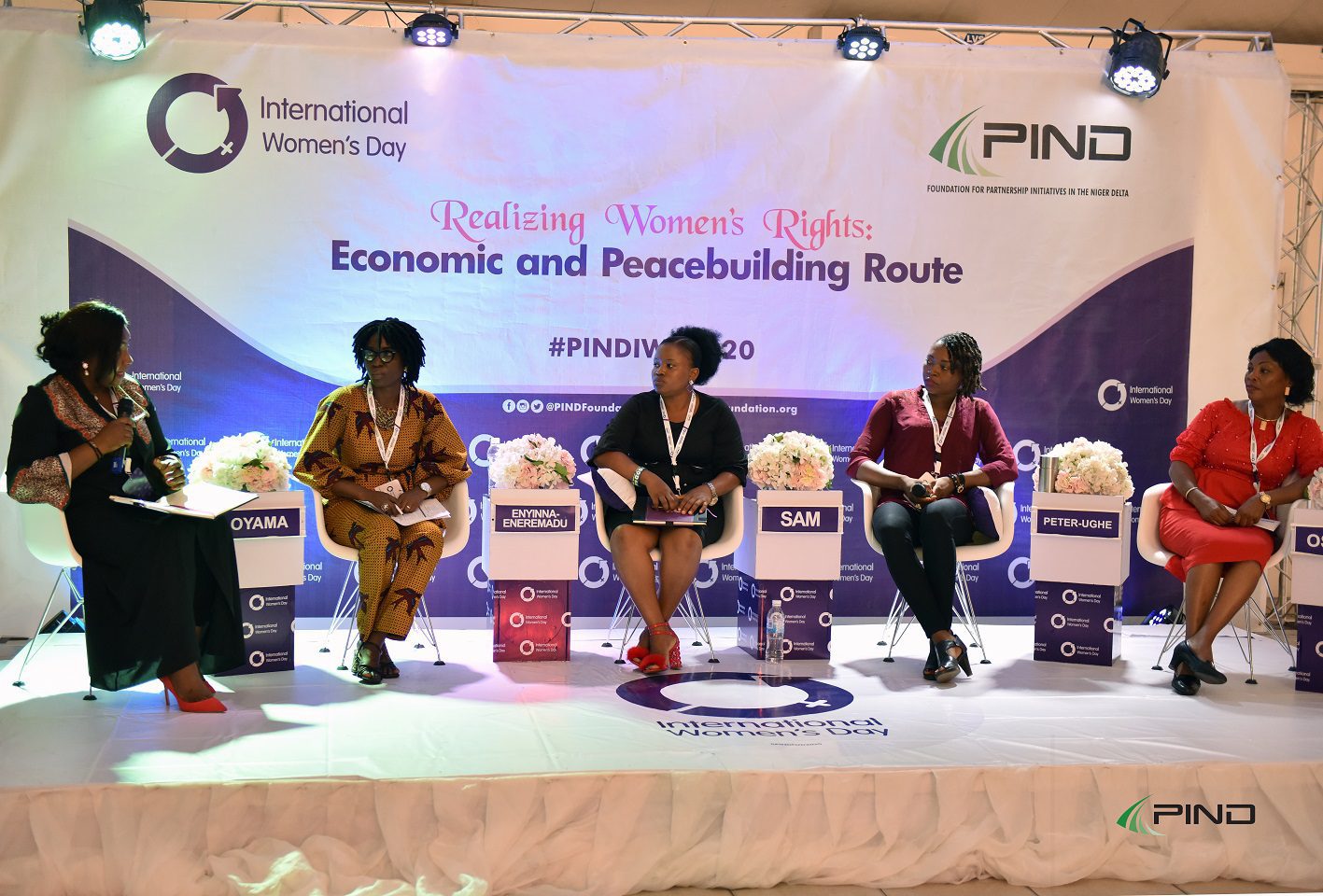
The Panel (Lilian Oyama, Nnenaya, Benedicta Peter-Ughe, Agatha Oseike, and Blessing Ephraim
To finish off the day’s subject matter at the Round table, PIND convened a panel to discuss the impact of its economic and peacebuilding programs on women in the Niger Delta. Four panelists were drawn from different sectors of PIND programs: Benedicta Peter-Ughe, market development; Nnenaya Enyinna-Eneremadu, casava value chain; Agatha Osieke, peacebuilding; and Blessing Ephraim Sam, Niger Delta Youth Employment Project (NDYEP). The panel was moderated by Gender Specialist, Lilian Oyama. Below are some areas of impact on Niger Delta women through PIND’s economic and peacebuilding programs, as well as challenges and priority actions stated in the session:
- Prioritized activities and gender inclusiveness have impacted women in aquaculture, construction and business enterprise sectors. Many women now have the drive, guide and confidence to navigate to male-dominated skills, and occupying leadership positions previously held by men.
- Though millions of people in the past years have been sensitized on the concept of Gender-Based Violence (GBV) and Violence against Women and Girls (VAWG) and how the society could prevent them; there is need to ameliorate and build on lessons learned about gender equality and mainstreaming.
- There has been significant improvement in livelihood of women, increased women and young girl skills, successes beyond farmed fish processing, buying and selling. Women are becoming investors in aquaculture and real estate as recorded in Ondo and Benin.
Insight 4: From Panel Discussion on Challenges to Gender Equality that must be Addressed
The panel identified the existing challenges to be tackled as these:
- Lack of access to finance, education, empowerment and capacity building.
- Sexual harassment, insufficient advocacy, religious restriction of women and women refusing to partake in capacity building events except given money.
- Women exclusion from decision-making body, as well as cultural exclusion of women and the belief that only men can lead things.
Insight 5: From Panel Discussion on Priority Actions Stakeholders can take Towards Gender Equality.
The panelists spoke on actions stakeholders must take to address the gender challenges if they are to see significant results in closing the gender gap:
- Building the confidence of women regardless of their capacities and educational qualifications.
- Increasing peer to peer mentoring.
- Encouraging women to be active members of leadership in their communities, workplace and politics.
- Persuading more gender enlightenment campaigns
- Bringing gender equity to offices and homes by talking to colleagues and family about it
- Intensifying the education of women in the rural areas of the Niger Delta to help them realize their rights as women
- Women being vigilant and not relax as they are not yet where they should be in society and the percentage of women in leadership, peacebuilding, and economic endeavors in Nigeria is still very low.
Insight 6: From Success Stories on Gender-mainstreaming Shared by Program Participants
Women who took part in several economic development and peacebuilding programs powered by the Foundation for Partnership Initiatives in the Niger Delta (PIND) shared their success stories. In the crux of their different stories summarized below, participants at the International Women’s Day 2020 shared the following vital lessons:
- Advocacy can spur women involvement in renewable energy– Tessy Edjekoluwo Ogbirou , from GGG (Great Green Girls) stated how her encounter with PIND on renewable energy and the knowledge gained gave her the awareness around women and girls’ involvement in the renewable energy sector. The meeting ignited the advocacy for the need for women to participate in renewable energy activities and today she is one of such women.
- Leadership skills building for women is key –Chief Mrs. Marian, Chairperson, micro-credit committee and gender personnel, Egbema-Gbaramatu Development Foundation, shared how her boosted confidence and increased leadership skills aided her to mobilize resources and renovate an abandoned health centre in her community. She now plays active leadership roles in several health and safety organizations, courtesy of knowledge gathered from numerous PIND training programs.
- Training of women in mediation is fundamental for environmental stability– Lillian Okonkwo,a broadcast Journalist with the Rivers State Television, shared how PIND enhanced her capacity in gender mainstreaming and peacebuilding through the Foundation’s Capacity Building for Local Empowerment (CAPABLE) program and the Partners for Peace (P4P). She applauded PIND for making it possible for her to sensitize men and women in our community on gender issues and projects without disrupting the relative peace in the community.
- Mentorship, empowerment and access to grant canaid women to implement economic development and peacebuilding projects- I.B Elobisi, CEO, Grassroots Initiative for Gender and Development, Delta State, stated that within two years, she was able to register an NGO and also secured two international grants and implemented projects. She gave kudos to PIND on women empowerment and mentorship.
- Prioritizing gender inclusiveness and training in male-dominated skills will improve livelihood of women and girls-Miss Uduak Thompson, an administrator by academic qualification but trained in carpentry by PIND’s Niger Delta Youth Employment Pathway (NDYEP) project expressed her joy for being enriched in capacity, not only in modern furniture designs and productions but in leadership, peacebuilding and conflict sensitivity which has aided the growth of her business.
- Training on improved technology and technical support can leverage business expansion and productivity for women– Ursula Osiso lawyer who turned fish farmer, stated how contact with PIND service provider (Mr. Alfred Ukane) who provided her technical services, has moved her from owning one fish pond to six fish ponds, resulting in increased productivity and expansion of her business.

